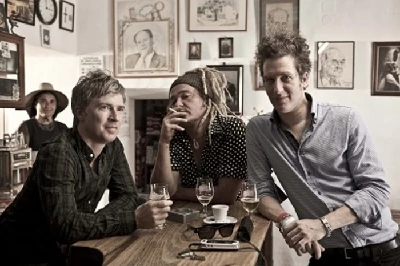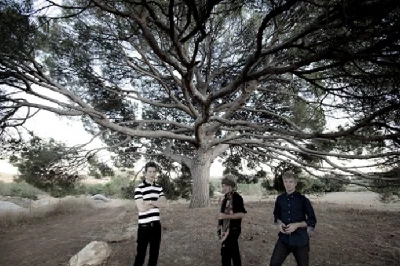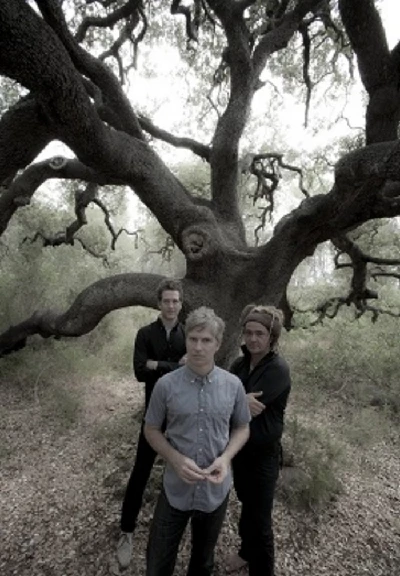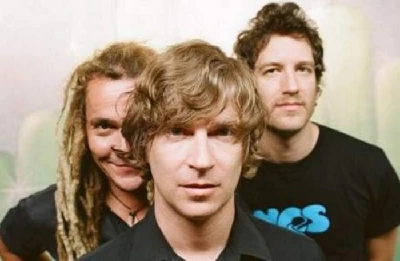published: 16 /
2 /
2012
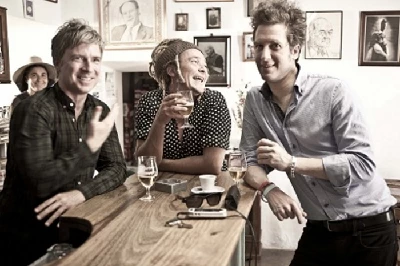
Jamie Rowland speaks to Matthew Caws, the front man with New York-based alternative rock act Nada Surf, about their extensive career and latest album, ‘The Stars are Indifferent to Astronomy‘
Article
In a career spanning twenty years (or near enough – see the interview below) Nada Surf have gone through a hell of a lot. Their first album, 1996’s ‘High/Low ‘gifted them with a major hit in the shape of their song ‘Popular’, which became a summer anthem and propelled them into the limelight. This success was short-lived however, as the notorious Difficult Second Album proved to be more difficult than most, with Nada Surf’s label – Elektra – pushing for more hits in the hope of raking in more cash with another ‘Popular’ (they even went as far as to suggest an acoustic version of ‘Popular’ be included on the album).
The band refused to budge; they knew what they wanted their album – now called ‘The Proximity Effect’– to be, and they were not going to change it for anyone. As such, they were dropped from their label and ‘The Proximity Effect’ had its US release withdrawn (although the band would eventually release it themselves on their own label).
It wasn’t until 2002 that the band returned with ‘Let Go’, which was released to critical acclaim and – more importantly – praise from their fans. From there, Nada Surf don’t seem to have let up. In the last ten years they’ve released four albums, each one a master-class in pop composition. I would have to say that their 2005 release ‘The Weight is a Gift’ is, for me, a faultless record, standing out particularly as it contains one of my favourite ever songs, ‘Do It Again’.
Their latest album, ‘The Stars are Indifferent to Astronomy‘ was released at the end of January and continues the band’s trend for releasing phenomenal records, seemingly without breaking a sweat. We caught up with vocalist/guitarist Matthew Caws (strong contender for ‘Nicest Man in Rock’) before the band played London’s Koko as part of ‘The Stars... ‘European tour.
PB: Nada Surf have been together for around twenty years now; is that right?
MC: That’s right, depending on how you look at it. Some people have been saying that in the press and I don’t want to dissuade them or disappoint them; with Ira (Elliot, drums), we’re probably at about eighteen right now. But with Daniel (Lorca, bass), I’ve been playing with him for about twenty seven years actually – if my math is right! We started when we were fifteen in school. We had a different name, we were called the Cost of Living, and then we were in a band called Because Because Because.
PB: It seems like – and this is my opinion, at least – your albums always seem to be just effortlessly made to a very high standard; you release an album one year – it’s fantastic. A couple of years later, there’s another one and that’s really good as well. Do you find that as time’s gone on it has become an easier process for you to write and produce your albums?
MC: Well, producing is probably easier, just because that’s not as much of a mystery and the more you do it you just kind of pick up more tricks, or things that you know work. But in terms of writing them...well, there’s the same thing a lot of songwriters say; you write one and then you think, “Oh well, that’ll never happen again, I don’t know how that happened!” And I still feel that way. But I guess my discipline’s maybe a little better – maybe! And I guess I realise more that I can’t control it, but that I do have to make the time to just sit down and see if something happens and put in the work a little bit. The work may be sitting around reading. I mean who knows what it is, but I’m not out with friends.
Another thing that happened this time round, which was great, was that the guys in They Might Be Giants moved to Manhattan and passed on their work space that they’d had for twenty five years to me. I moved to England this year, but there was a period before that – maybe six or seven months – a really golden period for me because I had an office, and I had my apartment. I had my apartment which was clothes, books and food, and my work space was everything else – every cable, every battery, every cassette, my three four tracks and eight one tracks, you know; just so much stuff. And that was really great, with this big, wooden kitchen table that I could sit down at and think. So that was good to organise.
I write sort of all the time, but unfortunately it’s in tiny little snippets of like, twenty seconds. So I’ll sit in front of the tape recorder, just make things up and then when I hit something good I get really excited about it, listen back to it about three or four times –and again it’s only twenty seconds long – and then I want a sandwich! And then I go outside, live life a little bit, then I’ll come back and do some more.
Unfortunately, what I’m left with sometimes are five or six cassettes that are full of stuff, and most of it is garbage. 2% of it is at least worth giving a second listen and worth considering and putting on a stack of possibilities. But listening back to those tapes is the hard part; I find it really difficult, because it’s hard to hear yourself be mediocre, you know? And yet you have to go through it. So having this work space gave me some strength to sit down and go, “Okay, at least these tapes are in a neat pile, and, even if this is not fun to do, I feel organised!”
This time I brought a lot less to the band; the last two or three records we ended up writing most of it in the studio, but this time – it was doing the covers record in fact,’ If I Had a Hi-Fi’, where we learned a lot. And one thing, which was embarrassingly simple to learn at my age, was that “Oh yeah, it’s good to have finished songs!” Because I realised we play differently - I didn’t know that. At a gig, you’re not sitting there working out an arrangement; you know what you’re doing so you can just get into it.
And there was this Bill Fox song, ‘Electrocution’, the first song on ‘If I Had a Hi-Fi’ where we were having trouble getting the right feel, and Ira said, “Let me try one by myself”. And he just did this fantastic drum track! Normally he can be quite restrained in the studio, and in fact I was frustrated for a couple of years by that, and then after ‘...Hi-Fi’ I realised – you idiot. It is not his fault at all; he’s faultless, he’s a fantastic musician. It’s my fault for not having finished this stuff! To ask him to give me a little bit of fire when we’re still working out what the outro is – who can blame him? He’s got to know what he’s doing!
So we went in with ten [finished songs], we did it in five days; it was really great, really smooth and exciting, and our producer Chris Shaw is very, very good and gets such an exciting sound that we were going in and doing a take, and instead of coming out and listening and imagining if that could be the take or not, it would be coming out, jumping out of the speakers.
I hope that answers your question! I don’t know how we do it every couple of years. It’s funny with rock’n’roll right, because it’s supposed to be easy – be-bop-a-lula, you know? And yet, it’s not. ‘It’s Hard to Be Easy’ is actually a song title from a band that Ira was in called Champale.
Another thing I’ve given up on is trying to make anything too complicated for the sake of it. A few years ago, I had the chilling realisation that I repeat the same chord progressions a lot, and I was upset by that and then was really trying to make up weird chords for a day, and then gave up and thought this is just what I do. It’s like when I first learned to play guitar – do you play guitar?
PB: A little bit, yeah.
MC: Well, you probably know enough to have figured out or for someone to have shown you that the blues is three chords, right? And when I first saw that and I was like, “So you go from the A to the E to the D”, my immature young mind thought, “Oh, then all blues songs are the same”. And now years later, shame-facedly, of course not. It’s all in the details, and it’s the same with pop, because a lot of it is the same chords, but since the life and the feeling in every song is different then it’s okay to just give up and say, okay well we do these same patterns, but the life of it is something else.
PB: Back in 1998, you were dropped by Elektra, your second album wasn’t released in the States, and then it wasn’t until the summer of 2002 that your third album, ‘Let Go’, was released. I don’t know if you see this in the same way, but I think if you listen to all of your albums there is a distinct difference between the records released pre and post-Elektra.
MC: Oh yeah, definitely.
PB: Were you quite happy in the end to have that break and perhaps mature a bit, if that’s the right word?
MC: No, no it is! I really was [happy to have that]. My answer to that question has really changed over the years, because now I think what happened with us, where we had a little hit with ‘Popular’, and then getting dropped and all that – that was the best thing that could possibly have happened; I think it’s great. It got our name out there, and then we started over with a leg up; we had this leg up where people kind of knew who we were. Also, we were misunderstood, which is great. I think that’s the best, and I would always rather be in the underdog position.
For example, working on ‘The Weight is a Gift¬’ – which thankfully, I think came out well; I’m very happy with that record – but that was a scary one, because we were no longer a surprise. ‘Let Go’ was a surprise; no one was expecting us to do anything good, you know? And then when we were working on ‘The Weight is a Gift’, it was like, oh yeah, our identity isn’t “They’re a one-hit wonder, where did they come from?” Our new identity is “Oh yeah, we make good records – oh no!”
But yeah, it was an incredible period; we got to start over, it’s like doing a first album all over again. No pressure, no one’s watching. Making our second record, there was really this feeling of like... I don’t want to expose that I read the press, but I do and I try not to take it personally, but I’m aware what’s going on. So when we made that second record, it was like “we have got a lot to prove”. But with ‘Let Go’, we didn’t have anything to prove because no one was paying attention – it was incredible! I was just working at a record store, and I didn’t have to go to grad school or find a career or anything, because the band was just busy enough, with just enough potential and possibility left that it wasn’t totally rash of me to keep going.
It was like a paid vacation – not that it was paid; I was skint! – but it was psychologically paid, because it was a year or two of “Well, I can’t be trying any harder or doing anything different”. And it was a really good record store, a really weird one.
Cheesily, it was incredibly ‘High Fidelity’; it was like that and more. I can’t remember what the scene is, in the movie or the book where they don’t stock something really obvious – where someone comes in wanting that Stevie Wonder track. In this record store, we didn’t stock Elvis Costello records, or the Clash. Both of whom I adore, but it was only stocked by the guys running it, so it was all a lot of avant garde stuff, really old country, dub, and then a whole bunch of like whatever would normally be next to the Clash or next to Elvis Costello, but it just so happened that the buyers weren’t wild about that. And instead of it being the Beta Band that you would put on and sell eight million copies, it was Serge Gainsbourg, just because of the kind of neighbourhood it was; you could put that record on and, forget it! You’d sell like ten of them.
But that was the best thing that could have happened. We felt really free, and kind of blessed just to have a little bit of a career. You know, all this happened to us later – I was twenty seven when we finally got to put a record out, and I never took it for granted. It always seemed kind of miraculous to me and it never felt like the world owed me a living or success or anything.
When we put out ‘The Proximity Effect ‘ourselves finally, and toured with it...in this mid-western run, there’s all these bands in the south, south-west, mid-west that toured incessantly, and we went out with them and there would be like two hundred kids who, for their shows were freaking out – they were the kind of bands who do stadium shows in a bar. It just felt like a stadium show. We sold our copies of the record off the card table in the back of the rec room or whatever, and we’d sell ten or twenty copies to kids who were so excited! And even though it was so tiny, for us it was like a dream.
It’s what I’d always wanted – I was kind of a label fetishist to a certain degree, like a lot of people in that era; Matador was so great, and Merge were untouchable, you know? All these beautiful labels – Touch and Go, incredible records – and I’d sent stuff to all these labels and heard nothing back, but that’s kind of the world I really wanted to be in, that I really had romanticised.
But we ended up on a big label, where our agent wouldn’t let us do all-ages shows, and when we finally did put out ‘The Proximity Effect ‘we were like, “Hey, we’ve put it out – let’s tour!” and he’s like, “Well, maybe some weekends...” And our manager at the time was like “So you want to put out another record...with the same band name?” And it wasn’t because – it’s not the best name! – but that’s not why he was saying it; he was saying it because it’s like, you’ve gone out there and failed, so do you want to go out there again, tarnished? So we fired everybody and restarted our own way. So this was finally us getting our taste of the simpler, better world we’d always admired – we’d finally gotten in there. We’d had a taste of it, and we wanted more.
PB: On the new album, ‘The Stars Are Indifferent to Astronomy’, there are a few songs that touch on the passing of time or the past – ‘When I Was Young’ and ‘Teenage Dreams’ for example. Is that something you had been thinking about and actively wanted to explore in this album, or did it just come out naturally in the writing process?
MC: Well both, neither...I think those are themes we’ve had before, I think they’re more obvious now because some other things have been gotten rid of. I can only answer that in a reverse-engineering way, in that the conscious thing that changed with this record was that when we did ‘If I Had a Hi-Fi ‘we did a record release party, and we did all of ‘Let Go’ one night in one club, all of ‘The Weight is a Gift ‘the next night in another club, and all of ‘Lucky ‘the next night in another club.
So, that experience forced me to look at that stack of songs as one big thing and – aside from the usual thing which I mentioned before, which came up again; “Oh my God, they’re all the same!” – the other thing was...there’s a certain kind of self-analysis that I’ll do forever in my songs, but I’ve done a whole lot of it and it would be good to make an effort, at least try to do something else.
Metaphorically, the way it felt was that I had this camera pointing at myself and I was wrestling with the lens to look at something else! I don’t want to look back when I’m eighty at some stack of records and go like “All I did was stare in the mirror; that’s kind of pathetic”, you know? There’s a big world out there.
But sometimes, I mean as you’ll know, if you’ve ever gone through some personal issue or something, sometimes it’s this giant world and you can’t see any of it, because all you can see is this whatever issue is bugging you.
So I was really fighting against that with this record, and I think that’s why there’s more stuff about the outside world; there’s a lot about nature, a lot about the environment. And time...something like ‘Teenage Dreams’, I could have written that when I was 20 because it doesn’t so much have to do with my being older as just in general missing that feeling of when you’re young and you get out of school in June, and September is such a world away and it’s like magic. And now, you know the summer’s still long but you also know from sad experience that you can blink, you concentrate on the wrong thing, take your eye off the horse and - kapoof! It’s gone. So it’s about missing that feeling, and also believing that that feeling is always there, ready to go if you can just find it and nurture it.
And ‘When I Was Young’; well, I can tell you what that was sort of inspired by, a little bit. The bit at the end, that chorus, I wrote that like seven years ago, and we would play it endlessly sometimes, in a hotel room on the guitar and just never know what to do with it, like “That’s a cracking chorus, but I don’t know what to do with it.” Because we just didn’t want to change it; it seemed like its own thirty second song that was just great, quite good!
But I went to this Irish film festival, and there was a movie about a guy coming out to his parents as gay, and it’s a beautiful day, a beautiful house, a beautiful kitchen and his mother’s so lovely; loving eyes. And this kid tells her of his discovery about his identity and she’s so great about it and gracious and welcoming, and fade to clearings in a forest and...great! Cut to a dingy living room, parents smoking and drinking on he couch, which is collapsing because they’ve been sitting on it forever, and this kid tells them and they scream at him. So basically, it’s like how he wishes his life was and how his life is, and that difference between either our present or our past; what it is and what we wish it was, and what that difference is. Anyway, that’s the second verse of the song.
Again, I don’t think it’s a new thought for us; we’re always looking back a little bit. I mean what else do you have, really?
PB: You’ve mentioned your covers record,’ If I Had a Hi-Fi’ – what prompted you to do that record, and was it hard to pick what songs you covered?
MC: Well, it was done as a stop-gap. I mean basically it’s a little bit of laziness on my part in that classically, we’d make a record, tour a whole bunch, come home and my impression – and this might be wrong – but my impression is that for the other guys it’s the life of Riley. They’re like, “Hey I’m home, allright!” - where I immediately feel like I’m behind the eight-ball and I’ve really got to cook up some songs. So I thought after five albums, maybe we can afford to do this without it being a really lame move – you know, maybe it’s okay! And it was a way of staying busy without having to wait. Which ended up being great, because then we worked on this record, it hadn’t been as long a period of inactivity so the motor was running; our fingers hadn’t gone soft, we were still into it.
But the song selection process; what I really wanted to do was to make it as much like making our own record as possible in that we would only do songs that were new to us, or that the idea of covering them was new, and just keep it exciting. Because if we had said – and we did consider this for about five minutes – “So then it needs to represent our twelve favourite, most representative songs” then it quickly would have felt like homework.
You know, if we’d said we had to do a Clash song, a Kinks song – pretty soon it would have just felt like, you know, how’s this going to live up to the original, and God I know this so well - there’d be no thrill in it.
So we just said, "Look, Arthur Russell – brand new to me! I’d just seen that ‘Wild Combination’ DVD which someone had lent me, and I was talking to Jeff Barrett from Heavenly, our old label; we were talking to him on the phone and he was like,“Well, if you’re doing a covers record I would go and get ‘Love is Overtaking Me’, I don’t think there’s a bad song on it”; so I was like, “Alright cool, yeah I’ll get that”.
And then this friend of mine form New York, who’s one of these guys who every two months will send me a new track, he gave me that Muslims record for Christmas. So that was brand new to me. Kate Bush – ‘Love and Anger’ is a song I’ve been singing to myself every week since 1989, when it came out. I’ve been obsessed with it since. And the Moody Blues, that’s not even a song I like, but Ira was like, “That’d be really fun to do!” It was also more democratic, which was nice because we all got to pick and it wasn’t as precious a process.
So yeah, it was really just a lot of fun, and easy. You know we considered a bazillion songs, but in the end those were just the ones that felt most exciting to do.
PB: What is coming up next for Nada Surf and for you personally?
MC: A whole lot of touring, definitely. I think it’s going to take us up until Christmas. And that’s that really; I think we all have little musical projects we’re cooking up. I mean, one really nice thing about spending a lot of time doing this is that you meet more and more people that you want to make music with, so there’s a whole stack of people that I have indefinite, amorphous plans to do stuff with. So I’ll get to some of that once this whole thing is done.
PB: Thank you.
Band Links:-
http://www.nadasurf.com/
https://www.facebook.com/NadaSurf/
https://twitter.com/nadasurf
https://www.instagram.com/matthewcaws/
https://www.youtube.com/user/nadasurf
Picture Gallery:-
